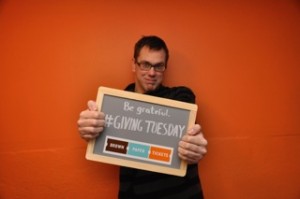![]() The bad news: From email newsletters to Facebook posts to the New York Times, the moment your prospective customers arise, they’re bombarded with things to read. You get a few mere seconds to hook ’em, which means your event description and website copy needs to be polished and punchy.
The bad news: From email newsletters to Facebook posts to the New York Times, the moment your prospective customers arise, they’re bombarded with things to read. You get a few mere seconds to hook ’em, which means your event description and website copy needs to be polished and punchy.
The good news: You don’t have to resort to all caps headlines (YOU’RE SCREAMING), inappropriate visuals or sixteen exclamation points to sell tickets.
1. Talk the Talk
Burlesque performer Sailor St. Claire’s website is an amazing example of brand voice and well-done copy. “With her scintillating wit and copious charms, Sailor channels academic excellence into burlesque bravura …”
Scintillating wit, copious charms. Just by the word choice, we know she is one literary lady.
Fancy $2 words work well to attract a bookish burlesque audience, but could turn away down-to-earth attendees of a hot dog eating contest. Use nomenclature that appeals to your prospective event goers.
2. Sensory Details
Good writing helps readers see what you see. Vague writing gives a blurry image and puts your reader to sleep.
Eliminate “beautiful, great, fun, perfect, unique” from your event page. “What makes it unique?” “Perfect?” “Fun?” Draw out the descriptive details.
Flex your vocabulary. If your event is a poetry reading at a “burnt-out warehouse down by the docks” (yes, that’s a Seinfeld reference), avoid the descriptive term, “unique.” It’s edgy. It’s industrial chic, a hip hideaway, a creative hive with high ceilings.
3. Be Specific
Avoid writing “we will serve food.” Your prospective ticket buyers won’t know if you’re going to hand them a bag of Fritos or a Cornish hen.
You might not know ahead of time the specific dishes you’ll serve, but there are nuances between words for food. “Snacks” is more dips, chips and veggie plates, while “hor d’oeuvres” is toothpick and finger sandwich food. “Snack” lends itself to a more casual affair, “hor d’oeuvres” says black ties and heels.
When specific, little details wrangle expectations and offer a clear image of the event.
4. Don’t Dare Bury the 5 “W”s
Providing sensory details helps your ticket buyers envision the event, but don’t bury who, what, where, when, why. Include your performers’ or instructors’ names and past performances or awards in your event description. Read this PR post for more on how to find your unique value propositions.
Break up the text to three sentences per paragraph. Avoid huge paragraph blocks. Add the nearest subway lines or parking tips to ease commuter anxiety. Let your event goers know if they don’t need to be “on time” and can just drop in.
5. A Few Words on Brevity
“I have only made this letter longer because I have not had the time to make it shorter.” Blaise Pascal, the Provincial Letters.
One mistake nascent writers make is far too much. Never assume your reader will pore over every word. In fact, assume that they won’t. Especially on an event page.
Go ahead, write it all out, but then go back in and trim, trim, trim. Here’s how:
Hunt down redundant terms and descriptions. Did you describe something twice? Are you guilty of duplicating details? (See what I did there?)
Just say no to passive voice. Passive voice is like an ill-fitting t-shirt. It isn’t wrong, but it isn’t doing you justice. Tattoo the words: am, are, was, were, be, being, been on the inside of your wrist. (OK, fine, just put them on a post-it near your desk.) When you notice these, switch up the sentence so it’s active.
Passive: The event was attended by more than 600 excited people.
Active: More than 600 excited people attended the event.
Punch it up. Employ one-word sentences and don’t fear phrases.
“Amazing. Still a ticket left to see our band rock the Warehouse this Friday. Is it yours?”
“It’s amazing, there is still a space left to see our band rock the Warehouse this Friday night at 3:00PM in the afternoon. Could it be yours?”
6. Prominent Call-to-Action (CTA)
Put a Brown Paper Tickets’ button or text link “above the fold,” (i.e. positioned in the top half) of your website. Never make your customers search for the link to buy tickets. Write your call to action in the imperative. Buy Now, RSVP, Join the Party. You can be creative, but for best results, give an action to take.
7. SEO for Success
Do not slap your flyer on your website and call it a day. Image files are not readable by search engines like Google. Fill out all related categories on your Brown Paper Tickets’ page and use keywords in your title and on the page (e.g. food and drink for a cooking event, etc.) More about SEO.
8. Hashtag It
 Advertise your hashtag on your event flyer and page and prominently display it on signage at the event. A hashtag points your attendees to where to talk about your event and streamlines feedback for your post-event analysis. Encourage your attendees to post photos. Research hashtags.
Advertise your hashtag on your event flyer and page and prominently display it on signage at the event. A hashtag points your attendees to where to talk about your event and streamlines feedback for your post-event analysis. Encourage your attendees to post photos. Research hashtags.
Have a writing tip? Ring in below.
Event Tips >


 Arts
Arts Comedy
Comedy Event Tips
Event Tips Film
Film Food & Drink
Food & Drink Good Causes
Good Causes Music
Music News
News Radio
Radio Roller Derby
Roller Derby